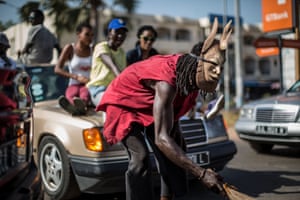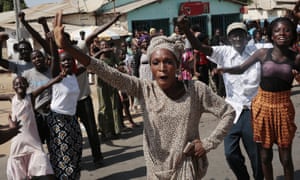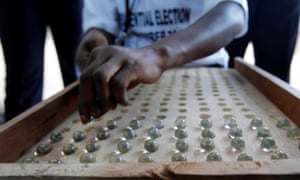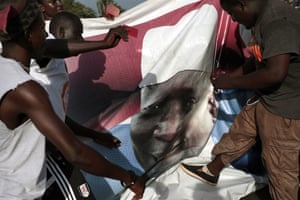
Adama Barrow
- Incoming president, Adama Barrow, says Jammeh called him offering his congratulations after shock result
The Gambia’s autocratic president, Yahya Jammeh, who once claimed a “billion-year” mandate to rule, has conceded defeat after a shock election loss to a real-estate developer who once worked as a security guard in London.
Jammeh had kept the tiny west African country under an iron grip for more than two decades, and there were fears that the eccentric 51-year-old would use violence or fraud to maintain power.
Instead he became a rare dictator to accept defeat in a democratic election, agreeing to hand power to challenger Adama Barrow, a softly spoken businessman who previously had little public profile.
Barrow told the Guardian that Jammeh had called him to concede defeat with the words: “Congratulations. I’m the outgoing president; you’re the incoming president.”
The father of five used his lack of political baggage to woo voters desperate for change, claiming 45.5% of the vote to Jammeh’s 36.7%. If Jammeh sticks to his word, Barrow will become only the third Gambian head of state since the country’s independence in 1965.
In a televised statement, Jammeh said the vote had been “the most transparent election in the whole world,” adding that he would not contest the result.
“I take this opportunity to congratulate Mr Adama for his victory. It’s a clear victory. I wish him all the best and I wish all Gambians the best. As a true Muslim who believes in the almighty Allah I will never question Allah’s decision. You Gambians have decided,” he said.
The prerecorded message then cut to a shot of Jammeh phoning the president-elect.
“Hello, are you hearing me?” Jammeh asked Barrow, grinning widely on his mobile. “I wish you all the best. The country will be in your hands in January. You are assured of my guidance. You have to work with me. You are the elected president of The Gambia. I have no ill will and I wish you all the best.”
Barrow said he was confident Jammeh would stand down. “Power belongs to the people. It’s the people who have spoken. He cannot hang on,” he said. “We won the election clearly so there’s nothing he can do about it.”
Barrow said his priority was to name a cabinet. “I’m very, very happy and excited. I’m happy that we won this election.”
Even the head of the electoral commission, Alieu Momarr Njai, seemed stunned by Jammeh’s rapid concession.
“The president is magnanimous enough to accept that he had lost the election, and he will call the new president to congratulate him as well as to pray for peace and tranquility,” he said after announcing preliminary results. “It’s very rare that this present situation now, in Africa, that this happens.” .
Internet and international phone services cut off for “security” during the poll were restored soon after Njai’s announcement and, as news of the election result spread, the country erupted into celebration.
The streets of the capital, Banjul, deserted until that point, began to fill with cars screeching their horns and blasting out music.
Children sang, men stripped off their shirts and punched the air, and others went online to celebrate using the hashtag gambiadecides. Several said the historic change had moved them to tears.
One Twitter user, Muhammad Sanu Jallow, said:
Muhammad Sanu Jallow(@msjallow)
I couldn't hold back the tears. I'm almost 30, and I've known only 1 President this whole time. Good time to be alive. #GambiaDecidesDecember 2, 2016
Gambians abroad joined the celebration, with several saying they were planning to return or expected friends and relatives to head back.
EffSalla-lamtoro(@effsalla)
Thanks to Allah!!!!🙏🏽Now our very own can return back home and play their part in developing our motherland 🇬🇲🇬🇲🇬🇲✌🏾️✌🏾️✌🏾️😪#GambiaDecides #December 2, 2016
The country’s poverty and repressive political climate means many Gambians live overseas, particularly in Europe, even though it is one of Africa’s smallest states with only 2 million people.
Casting his vote on Thursday, Jammeh said he was confident of winning “a bigger landslide” than the Gambia had ever seen, and refused to say whether he would concede if he lost.
This year’s election was the first time since 1994, when Jammeh seized control of the country in a coup, that he faced a serious challenge to his rule. Over that period he consolidated power in a series of presidential elections, and skilfully exploited tribal and other divisions among multiple opposition parties.
Opposition politicians, journalists and activists were arbitrarily arrested, thrown into jail, tortured and killed during Jammeh’s tenure.
Njai had been about to announce the latest batch of results when he received a call on his mobile phone. He told waiting observers and press that the president knew the result and was ready to concede.
The interior minister, sitting in a magnolia office cubicle and trembling behind his sunglasses, called on all to remain calm.
“Keep the peace and tranquility,” Modou Bah said. “People should go for their lawful businesses. We should not allow politics to divide us.”
Meanwhile, those hosting the live broadcast of election results on state television could not hide their astonishment.
“Have all the people loyal to the president migrated?” asked Malick Jones, presenting an all-night broadcast of Gambia Decides, when he realised Jammeh had lost the capital.
Outside Barrow’s house, crowds gathered, some celebrating and some in shock. Anger at Jammeh for his decades of repression bubbled up in others.
“We’ll put him in jail. We want him to go to the [international criminal court],” said Adama Faye, an 18-year-old student. “He killed my father – I promise you, he did. Since I was born, I haven’t felt this kind of happiness.”
Jubilant crowds sang, whistled, cheered and stormed Barrow’s compound in celebration trying to get in and shake his hand, as a man with a basket-hat and a posse of bouncers tried to keep them out.
Inside, the first lady-elect, Fatou Bah, the first of Barrow’s two wives, arrived in a blue dress and large gold earrings and was blessed by a close family friend, Catholic priest Bruno Toupan.
Barrow is a devout Muslim, and Toupan said his decision to call a Catholic to bless the family was proof that he would be a president for all Gambians.
“We have great hope in the Gambia,” he said. “It’s a great relief, as Jammeh was planning to bring in sharia law. I would have been a second-class citizen.”
Cheering crowds also gathered outside the home of Ousainou Darbo, the opposition leader who was sentenced to three years in prison in April, giving rise to Barrow’s candidacy.
His court hearing will be on Monday and the crowds were calling for his release. Amnesty International added its voice to these calls.
“An immediate first step for this new government is to release political prisoners and those who have disappeared,” Sabrina Mahtani, from Amnesty International, said.
“We’ve seen how important the rights of freedom of information and freedom of assembly are over the last few weeks – it’s important that the new government reforms repressive laws.”
https://www.theguardian.com/world/2016/dec/02/the-gambia-president-jammeh-concede-defeat-in-election











No comments :
Post a Comment